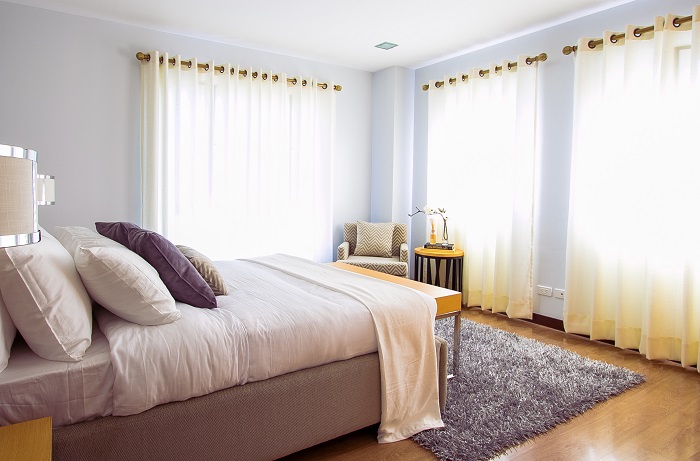With recent research highlighting the impact sleep can have on your overall health, it is no surprise that more people are looking for ways to make their bedrooms more conducive to sleep. However, knowing where to begin can feel a little overwhelming.
To help you with your decorating journey, we have compiled a list of the most important things to consider when decorating for a better night’s sleep.
Select Colors Conducive to Sleep
As you start out decorating your bedroom, the first thing you will want to consider is the color scheme.
Color plays a large role in how quickly our minds and bodies relax. Certain colors can cause you to feel more anxious and stressed, while other colors bring an immediate sense of calm.
Below we have included a list of colors you can utilize to promote sleep, as well as a list of colors you should avoid.

Bedroom Colors to Utilize:
- Blue – Pastel blues can have a very soothing effect on the mind and body, making them ideal for the bedroom.
- Lavender– Light lavender colors can bring a sense of tranquility.
- Pink – Pastel pink can bring an element of lightness and peace to a room. However, be sure to choose a pink that does not have too much red in it, as this can create overstimulation.
- Green – Green’s close association with nature makes it one of the most soothing colors you can use in the bedroom. These shades can leave you feeling more balanced.
- Gray – Light grays offer a natural feeling. Because it is a neutral color, it also works well with many other color schemes.
- Tan – Tan and beige colors can invoke a sense of warmness which is inviting and comforting.
- Yellow – Pale yellows can give us the feeling of being surrounded by sunshine, helping us to feel more relaxed and at peace.
Bedroom Colors to Avoid:
- Red – Shades of red should be avoided as they have been shown to affect stress, increase blood pressure, and increase heart rate.
- Orange – Orange has been shown to increase vitality and energy; however, it does not promote restfulness.
- Yellow – Muted yellows can help with relaxation, but bright yellows increase wakefulness.
- Dark Browns – These shades can bring with them a gloomy, heavy atmosphere, making it difficult to relax. Instead, opt for light shades of brown, such as tan or beige.
- Lime Green – Warm greens are ideal for relaxation, but lime greens promote vigor and liveliness, making it difficult to sleep.
- White – Although white is a popular color for the bedroom, it is often sterile and cold.
- Steel Gray – Warm grays can have a calming effect; however, cool grays can have an impersonal and uninviting feel to them.
Bedding
The list of calming colors above can also apply to your choice of bedding. Try to choose bedding in a color that promotes peace and relaxation, rather than a color that is energizing.
Also, choose materials suited to your needs. If you tend to sleep hot, choose sheets that are made of breathable fabrics, such as cotton and linen.
If you live in a colder climate and tend to be cold at night, consider sheets made of fleece and flannel. Above all, you should find bedding that is personally appealing and comforting to you.

Choose a Good Mattress
A soothing color scheme can help promote relaxation, however, you will not be able to find a proper night’s rest if you are sleeping on a mattress with inadequate support.
If you are waking throughout the night with pain or discomfort, it may be time to consider purchasing a new, comfortable mattress.
Mattresses that feature memory and latex foam can be great for providing no-pressure support to joints and muscles. Hybrid mattresses combine memory and latex foam with innerspring coils and are a great option for heavy sleepers.
When decorating your bedroom for the best sleep possible, be sure that your mattress is meeting your comfort and support needs.
Blackout Shades
Too much light in your bedroom can inhibit sleep. Ensuring your bedroom is as dark as possible will help you find sleep quicker. One way to achieve this is with blackout shades.
These shades can be customized to fit your windows, making sure no light finds its way into your room.
Remove Electronics
Light from electronic screens, such as phones, televisions, and computers, can interfere with your body’s ability to produce melatonin. Since melatonin is vital to helping your body feel sleepy, too much screen time can cause you to stay awake longer. Consider removing electronic screens from your bedroom or turning them off at least 2 hours before bedtime.
If you have a television in your bedroom, consider putting it in a cabinet where it can be covered or turned away from you while sleeping. This also applies to electronic light from cable boxes, digital alarm clocks, and phones.
Because it is often inconvenient to remove your phone from the bedroom, consider placing it face down on your nightstand and putting it on Do Not Disturb while you sleep.
Reduce Noise
Making your bedroom as quiet as possible can also help promote a better night’s sleep. If you have hardwood floors, consider putting down rugs to help reduce sound echo in the room.
Upholstered furniture, such as beds, chairs, benches, and ottomans, can absorb sound and help cut down on noise.
Reduce Clutter
Thinking of your bedroom as a place of respite will help to promote a calmer night’s sleep.
This means all objects in the room must be associated with sleep and relaxation. Consider removing work desks and computers from your bedroom, as these are associated with work and tend to increase stress and anxiety.
Workout equipment, such as treadmills and stationary bikes should also be removed from your sleep space since they can be a distraction from sleep and do not promote relaxation.
Temperature
Since your body temperature drops as you sleep, keeping your room at a cool temperature will help you sleep more soundly.
Ideally, you should aim to keep your bedroom between 60-67 degrees. If you tend to sleep hot, be sure to opt for pyjamas in a breathable material, such as cotton.
Getting adequate sleep night after night has significant health benefits. These tips will help you create a sleep place that is peaceful, soothing, and conducive to a better night’s sleep.